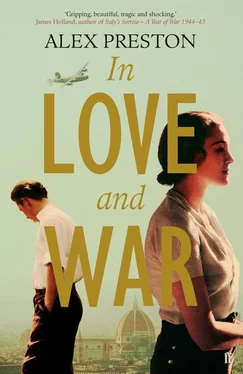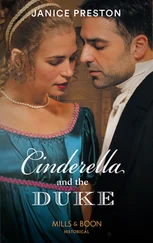He hasn’t heard from home for over a year now, and he wonders how his parents are getting through the war, if his mother’s still locked up. He wonders about Rudyard, whether he’s alive, or dry bones in a desert, or heaving a pickaxe in some wind-lashed Silesian prison camp. Now Ada comes out to join him. She is wearing the green and white uniform of an ambulance driver. She hands him a cup of orzo which he blows on and sips, pulling a face.
‘It’s frightful, isn’t it?’
‘ Parliamo italiano oggi, carino, ’ she reminds him, smiling. They’ve been in the villa so long that Esmond feels panic in his chest at the thought of leaving. He pats the Beretta in the holster on his hip, remembers he isn’t meant to use his right arm, and takes another sip. It’s the first time since coming to the villa that he has really missed smoking.
‘You should put on your cast,’ she says, and he has to think for a moment about the word — ingessatura . She hands him the white plaster — fashioned by the ever-resourceful Maria Luigia — and a sling which he hooks over his head. His arm feels heavy and strange dangling on his chest. ‘We must go,’ she says.
They lock Tatters inside the house with a bone that he begins to gnaw, barely noticing them leave. They go down past the swimming pool into the copse, leaves thick and wet underfoot. Esmond helps Ada over the wall at the bottom of the garden — slipping his arm out from the sling and holding her hand with thickly bandaged fingers — and then they are in the via San Carlo where Bruno is leaning against the bonnet of the ancient Bianchi. He smiles at them, cocking his matchstick.
‘You’re ready?’
Ada nods.
He drives them down through the city and Esmond has to fight an urge not to press his nose to the window. Florence is deserted. A few stray dogs worry bags of rubbish outside the Pitti Palace. Cars sit on their haunches, their wheels removed for the rubber, their owners unable to find or afford petrol. When they come to the via Tornabuoni, Esmond reaches over with his good arm and takes Ada’s hand. He can feel his pulse against her cool flesh. She is made for this, he thinks.
‘Your British Institute, it’s now used for meetings of the Committee of Fascist Youth,’ Bruno says. ‘They’re training the next generation of cannon fodder, teaching range-finding and ordnance in that beautiful library.’ He shakes his head and then brings the car to a halt outside Pretini’s hair salon. ‘I must leave you here,’ he says. ‘I can’t risk anyone seeing me with you. Now, you know what you’re required to do?’ Ada nods. ‘Don’t speak too much,’ he says, looking at Esmond. ‘If you’re caught, give them the information we agreed. Nothing about the Professor, nothing about supply lines. Good luck.’ They climb out into the cool morning. Esmond finds himself wondering what else he knows that the Fascists could possibly want. Some meaningless code names, a few fuzzily recalled locations in the hills that he’s transmitted over the W/T. The Professor is all he has.
He can see his breath in the air as they walk down the via degli Avelli towards the station. Ada is a few steps ahead, carrying a small case with a red cross on it, which she swings jauntily by her side. They wait for a tram to pass and walk out of the shadow of Santa Maria Novella. The railway station stretches in front of them; from under the brow of its porch beetles a line of commuters; travellers trying to keep up with their porters; soldiers embracing their wives and lovers in the gloomy ticket hall, greetings and farewells. Esmond spots another Bersagliera with a rifle across his back. The man salutes when he sees the caporal maggiore stripes on his shoulders. Esmond nods down at his arm, mutters ‘Va bene,’ at the soldier and follows Ada into the station.
Carabinieri stand in their kepis by the ticket gates, asking for documents only from the young girls as they board trains for the coast. Ada, whose hair is up beneath a peaked cap, passes the carabinieri and walks forward to the platform where the train to Livorno is beginning to puff. Esmond starts to follow her when one of the policemen holds out an arm.
‘ Documenti, per favore, ’ the policeman says, scowling at Esmond’s bandaged arm. Esmond reaches awkwardly inside his jacket and fumbles for his military identification card and notification of disability. He fights not to look towards Ada on the platform. The policeman stares at the documents and then at Esmond.
‘ Dove andate? ’
Esmond clears his throat and hesitates. Now he does see Ada, fumbling in her case, glancing at him. He stares back at the policeman and, in barely more than a whisper, says, ‘Vado a una clinica ortopedica a Livorno. Ho un appuntamento con un dottore Hartmann lì.’ He holds his breath as the policeman looks again at his papers, finally handing them back with a ‘Grazie’ . Esmond walks through the gates and, without looking at Ada, boards the train for Livorno, his pulse visible in the corners of his eyes.
They get off at Empoli. The weather has turned for the worse, thunderclouds rolling across the sky from the west. Esmond makes sure Ada has seen him and crosses the road into the park opposite the station. He waits on a bench beneath a plane tree, where she joins him, at the far end, opening her case on her lap.
‘Was it close?’ she asks.
‘I don’t think so. He just wanted to get some sweat out of a soldier. If my Italian isn’t good enough by now—’
‘Your Italian is fine.’
They leave the park and walk past a group of cafés and down a road of blank-faced houses. After a few hundred yards, they stop in front of a building with a faded sign: ‘Hotel Superiore’. There is the sound of singing. Ada rings the bell. They wait for several minutes and finally the bolts are drawn back. A hunched old woman in black opens the door and leads them silently into a courtyard and up a staircase. On the piano nobile they make their way into a gloomy apartment. The old lady leaves them, shutting the door behind her. The singing gets louder. Esmond follows Ada into the bedroom where, against the open windows, an enormous man is performing ‘E Lucevan le Stelle’ from Tosca for the assorted pigeons and sparrows on the rooftops. His back to the room, he quivers at the highest notes, his voice breaking. Finally, after a sudden pause, he turns towards them.
‘Welcome,’ he says in an accent Esmond cannot place. He kisses Ada and shakes Esmond vigorously by his plaster cast, letting out a burbling laugh. He sits down on the bed, motions to two armchairs opposite and pours them out a glass of wine each from the bottle beside his bed.
‘ Bene, ’ he says, letting out another laugh and raising his glass. ‘I am Oreste Ristori. To your health, young ones — it’s never too early for a sip, heh?’ His face shines as if recently polished. He’s older than Esmond had thought, his vastness hiding wrinkles that only reveal themselves in repose. Above the fireplace on one side of the room are several photographs of a woman who, for a moment, reminds Esmond of Wallis Simpson. In some of the pictures she is in battle fatigues, in another she stands at a waterfall holding a rifle in one hand, her face streaked with mud or blood.
Ristori goes to stand beside the pictures, picking one from the mantel and passing it to Esmond. The silver frame is cold to the touch. She is beautiful. A string of black pearls hangs from her throat.
‘My Mercedes,’ the man says. ‘My star in the dark night. I write to her every day, not knowing even if she receives my letters. She was in gaol in São Paulo. Now she is fighting Vargas’s government in the jungle, with the anarchists, the guerrillas. In Brazil. You see how remarkable she is?’ He beams at Esmond. ‘You see how a man might spend his life for a woman like this?’ He knocks back his wine and sits down on the bed, pouring another. He hums a few more bars of Tosca as he sips. It is cold in the room and Ada gives a shiver.
Читать дальше












